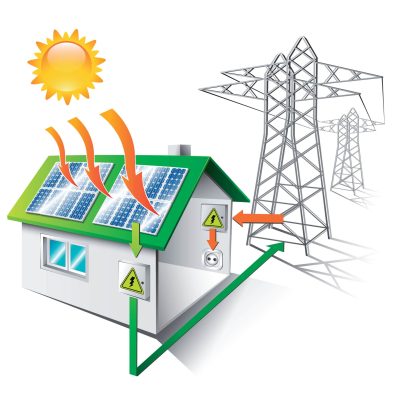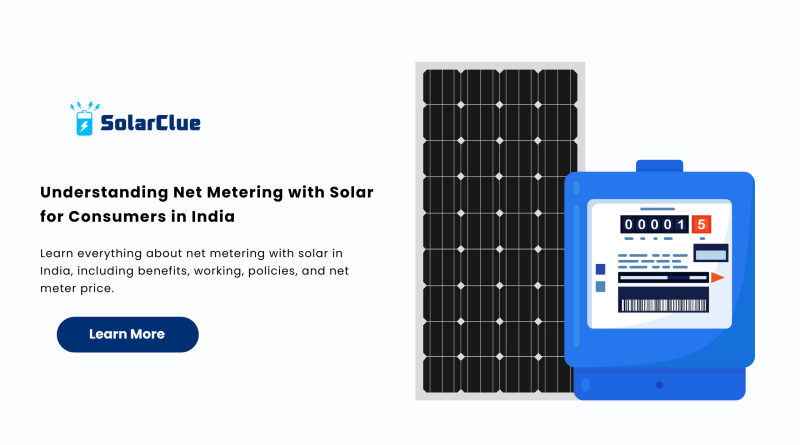Understanding Net Metering with Solar for Consumers in India
With rising electricity costs and growing environmental concerns, solar energy has emerged as a game-changer for both residential and commercial users. One of the most beneficial mechanisms in solar adoption is net metering with solar, which allows consumers to reduce their electricity bills by feeding surplus energy back into the grid. But how does it work, and why is it important? In this guide, we’ll explore everything you need to know about net metering with solar, its benefits, installation process, policies, pricing, and challenges in India.
Table of Contents
- 1 What is Net Metering with Solar?
- 2 How Does Net Metering with Solar Work?
- 3 Benefits of Net Metering with Solar
- 4 Understanding the Net Meter Price
- 5 Steps to Install a Net Metering with Solar System in India
- 6 State-wise Net Metering with Solar Policies in India
- 7 Common Challenges in Network Metering
- 8 Future of Net Metering with Solar in India
- 9 FAQs
What is Net Metering with Solar?

Net metering with solar is a billing mechanism that allows consumers to export excess solar energy generated by their solar power system back to the electricity grid. It helps reduce power bills by crediting surplus power, making solar adoption financially rewarding. This system ensures that no energy goes to waste and maximizes the efficiency of solar panels.
How Does Net Metering with Solar Work?
1. A solar panel generates electricity from sunlight.
2. If energy production exceeds consumption, excess power is fed into the grid via a solar meter.
3. Consumers receive credits based on the net metering policy.
4. At the end of the billing cycle, the electricity provider deducts credits from the total bill.
5. If more energy is consumed than generated, the consumer pays for the net electricity usage.
Net Metering Calculation Example
Let’s assume a consumer generates 500 kWh of solar electricity per month but consumes 400 kWh. The extra 100 kWh is sent to the grid and credited. The next month, if the consumer uses 600 kWh, the 100 kWh credited earlier will be deducted, and the bill will be for 500 kWh instead.
Benefits of Net Metering with Solar
1. Reduced Electricity Bills
With net metering with solar, consumers can significantly cut electricity costs by using generated power and selling excess energy back to the grid.
2. Efficient Use of Renewable Energy
A solar power system contributes to a greener environment by utilizing solar energy efficiently. It reduces dependency on fossil fuels and helps lower carbon footprints.
3. Government Incentives & Policies
Indian states offer subsidies and incentives for net metering with solar, making the transition more affordable. The Ministry of New and Renewable Energy (MNRE) provides financial assistance for installing solar panels.
4. Better ROI on Solar Investment
Consumers can recover their investment in solar panels faster by utilizing network metering benefits. The payback period for solar power systems is usually around 5-7 years.
5. Energy Independence
With solar power, consumers are less dependent on conventional electricity sources, leading to greater energy security.
Understanding the Net Meter Price
The net meter price varies based on state policies, supplier, and meter type. Typically, it ranges from ₹5,000 to ₹20,000, depending on the technology used. Some state governments offer subsidies to lower the net meter price, making it an affordable investment.
Steps to Install a Net Metering with Solar System in India
1. Choose a Reliable Solar Provider – Visit SolarClue to find the best solar panel solutions.
2. Apply for Net Metering – Register with your local DISCOM (Distribution Company) for net metering.
3. Approval Process – Get approval from the electricity board before proceeding with installation.
4. Installation & Inspection – Get your solar meter installed and inspected by authorities.
5. Grid Connection – The system is connected to the grid for seamless power transfer.
6. Start Saving on Power Bills!
State-wise Net Metering with Solar Policies in India
Different Indian states have unique policies for net metering with solar. Here are some key highlights:
1. Maharashtra: Offers net metering for residential and commercial users with a maximum system size of 1 MW.
2. Delhi: Consumers can avail of solar subsidies along with net metering benefits.
3. Karnataka: Net metering is available for rooftop solar installations up to 2 MW.
4. Tamil Nadu: Government provides incentives to encourage solar energy adoption.
5. Gujarat: One of the leading states in India promoting solar power net metering.
For the latest updates, visit SolarClue Blog.
Common Challenges in Network Metering
1. Approval Delays – Bureaucratic processes can slow down applications.
2. Grid Constraints – Some areas face limitations in accommodating excess solar energy.
3. Tariff Fluctuations – Different states offer varied tariffs for exported energy.
4. High Initial Cost – While long-term savings are significant, the upfront cost of solar panels and net meter price can be a barrier.
Future of Net Metering with Solar in India
The Indian government is pushing for greater solar adoption through improved net metering policies. With increased investments and technological advancements, solar power systems are becoming more affordable and efficient. By 2030, India aims to generate 40% of its electricity from renewable sources, making solar power net metering a crucial component of this vision.
FAQs
1. What is the cost of a net meter in India?
The net meter price depends on the state and supplier, typically ranging from ₹5,000 to ₹20,000.
2. Is net metering with solar available for residential consumers?
Yes, most states in India offer net metering with solar for residential, commercial, and industrial users.
3. Can I sell extra solar energy to the grid?
Yes, with net metering, excess solar power is credited to your electricity bill.
4. How do I apply for net metering with solar?
You can apply through your electricity provider or a trusted solar solutions platform like SolarClue.
5. What is the lifespan of a solar power system?
A solar panel typically lasts 25+ years, making it a long-term sustainable investment.
6. What are the main benefits of net metering with solar?
It helps in reducing electricity bills, promotes clean energy usage, provides government incentives, and improves energy security.
7. Does net metering work during power outages?
No, in most cases, net metering requires a grid connection and will not function during a power outage unless you have a battery backup system.
8. What happens if I produce more solar power than I consume?
The excess energy is credited to your account and adjusted in your next electricity bill.
Switch to net metering with solar today and start saving! Visit SolarClue for top solar power system solutions.




